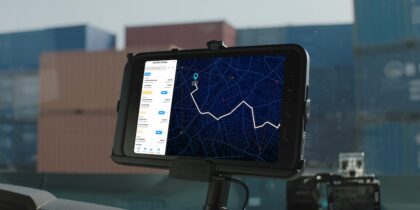As warehouses and manufacturing facilities add complexity to operations and become more connected, managers need a way to do more with their computing devices. These changing roles require increased computing power, device portability and flexibility to work from anywhere.
Through technology like Samsung DeX, employees and management can enhance productivity while using a smartphone as their primary computing device. The DeX docking station provides an easy way to connect a monitor, keyboard, mouse and other peripherals to smoothly transition between mobile and desktop-based workflows. The new DeX pad even lets you use your phone’s touchscreen as a trackpad, and with a future update, will enable the on-screen keyboard as well — for those times when you really need to travel light.
DeX lets users access the data on their phone in a traditional desktop environment, expand commonly used applications to a full monitor for better visibility, and utilize virtual desktops for convenient data sharing — making information universally accessible while reducing the device count in the warehouse.
Transforming the Way People Work
When managers spend time on the warehouse floor, they require all sorts of visibility into daily operations and a variety of technology functions.
For smartphone capabilities, Samsung Galaxy devices make it easy to collect data. The Note8 lets users take notes with the S Pen in real-time and is equipped with a high-resolution camera for inventory photos or scanning applications. By capturing everything with one mobile device and cloud-based storage, warehouse personnel can automatically centralize files for easy future access.
After connecting their phone to desktop peripherals, users can view data on a larger display, instead of trying to decipher it on a mobile-sized screen. Additionally, because native mobile apps are optimized for desktop mode, images and spreadsheets will easily scale to fit any sized monitor, decreasing the learning curve and helping ensure the accuracy of shipping data or incident reports.
Yet these capabilities aren’t just limited to traditional phone applications. DeX also mobilizes to popular desktop-based warehouse management platforms because it offers access to virtual desktop infrastructure solutions such as Citrix Receiver, Amazon WorkSpaces or VMware Horizon.
This means warehouses can continue to use existing systems and access them with DeX, without compatibility concerns for software and hardware. IT departments won’t have to reconstruct apps to work on smartphones and tablets and can help end users easily transition to a more mobile workflow.
In addition to increased mobile computing power, managers can also streamline communication capabilities even when they’re connected to DeX. Emails, messages and phone calls can be set to appear as desktop notifications — reducing the need to constantly check for notifications, and helping managers respond to events in real-time.
Secure, Streamlined Device Management
With this hardware and software combination, IT departments can set up a more manageable infrastructure, and also enhance security. The Samsung Knox security platform on all Note8, Galaxy S8 and S9 devices continues to operate when it’s plugged into the DeX dock, delivering defense-grade enterprise security with no additional steps for the end user.
This means that in a warehouse environment, enterprise and customer data will remain secure while it’s being accessed on the mobile device. The Knox solution also offers robust mobile device management, enabling IT staff to quickly apply updates across multiple devices, set specific profiles for different types of users and restrict certain functions for security reasons.
Ultimately, the DeX docking station and peripherals are designed to make jobs easier across the entire warehouse. For employees, it helps reduce the number of necessary work devices and streamlines data organization processes. When it comes to IT, administrators can manage fewer devices and increase security with one centralized platform.
These benefits can help improve manufacturing productivity, erasing the line between mobile and desktop computing and allow companies to keep up with today’s digital warehouse.
Learn more ways to boost supply chain efficiency by using IoT to create a smart warehouse.








